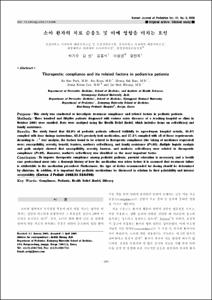소아 환자의 치료 순응도 및 이에 영향을 미치는 요인
- Keimyung Author(s)
- Kim, Heung Sik; Hwang, Jin Bok
- Department
- Dept. of Pediatrics (소아청소년학)
- Journal Title
- Korean Journal of Pediatrics
- Issued Date
- 2008
- Volume
- 51
- Issue
- 6
- Keyword
- Compliance; Pediatric; Health Belief Model; Efficacy
- Abstract
- Purpose : This study was conducted to investigate treatment compliance and related factors in pediatric patients. Methods : Three hundred and fifty-five patients diagnosed with various acute diseases at a teaching hospital or clinic in October 2003 were enrolled. Data were analyzed using the Health Belief Model, which includes items on self-efficacy and family assistance. Results : The study found that 62.9% of pediatric patients adhered faithfully to agreed-upon hospital revisits, 41 .6% complied with dose timings instructions, 65.8% precisely took medication, and 27 .2% complied with all of these requirements. According to χ2 test analysis, the factors found to be related to therapeutic compliance (the taking of medicines requested) were; susceptibility, severity, benefit, barriers, mother's self-efficacy, and family assistance (P<.05). Multiple logistic analysis and path analysis showed that susceptibility, severity, barriers, and mother's self-efficacy were related to therapeutic
compliance (P<.05). Moreover, mother's self-efficacy was identified as the most important factor. Conclusion : To improve therapeutic compliance among pediatric patients, parental education is necessary, and a health care professional must take a thorough history of how the medication was taken before it is assumed that treatment failure is attributable to the medication prescribed. Furthermore, the type of device recommended for dosing should be determined by clinicians. In addition, it is important that pediatric medications be discussed in relation to their palatability and internal acceptability.
목 적 : 소아과 외래를 방문하는 환자의 치료순응도 및 이에 영향을 미치는 요인에 대해 알아보기 위하여 본 연구를 시행하였다. 방 법 : 2003년 10월에 1개 대학병원의 소아과와 개인 연합의원의 외래를 방문한 환자 보호자 357명을 대상으로 설문 조사하였다. 건강신념모형(Health Belief Model)을 바탕으로 어머니의 자기 효능감과 가족의 지지를 추가한 새로운 연구모형을 개발하였는데, 연구 모형에 포함된 변수로는 치료 순응도, 감수성, 심각
성, 유익성, 장애도, 행동계기, 자기 효능감, 가족의 지지 그리고 사회인구학적 특성 등이었다. 결 과 : 소아 환자의 치료 순응도 중 재진 날짜를 정확하게 지키는 순응군은 62.9%, 약물 복용 간격과 시간을 지키는 순응군은 41.6%이었고, 마지막으로 정확한 양을 복용하는 순응군은 65.8% 이었다. 세가지를 모두 정확하게 지킨 순응군은 27.2%이었다. 치료 순응도 중 정확한 양을 준수한 경우만을 소아 약물 치료에서 순응군이라고 정의하였을 때, 단순분석 결과에서는 건강신념모델의 변수 중 감수성, 심각성, 유익성, 장애도가 그리고 가족의 지지, 자기 효능감이 유의한 변수였으며(P<0.05), 로지스틱 회귀분석과 경로분석에서는 감수성, 심각성, 자기 효능감이 높을수록, 장애도가 낮을수록 치료 순응도가 유의하게 높았으며(P<0.05), 특히 자
기 효능감이 가장 큰 영향을 미치는 것으로 나타났다. 결 론 : 소아 환자의 순응도를 높이기 위해서는 약물 치료에 대한 보호자 교육을 통하여 인지율을 높이고, 동기 유발과 보상, 그리고 가정에서도 쉽게 경구 복용이 가능하도록 향기롭고 맛이 좋은 시럽 형태의 약들이 개발되어야 하며, 정확한 양을 측정하여 복용할 수 있도록 측정용 주사기 또는 숟가락 제공시 의사와 약사의 조언 등으로 장애요인과 보호자의 자기 효능감을 고취시켜 환
자의 치료 순응도를 높여야 할 것이다. 또한 의료인들은 소아 환자에서 치료 실패시 이의 원인으로 반드시 환아의 약물의 순응 여부를 점검할 필요가 있다.
- Alternative Title
- Therapeutic compliance and its related factors in pediatrics patients
- Publisher
- School of Medicine
- Citation
- 박기수 et al. (2008). 소아 환자의 치료 순응도 및 이에 영향을 미치는 요인. Korean Journal of Pediatrics, 51(6), 584–596. doi: 10.3345/kjp.2008.51.6.584
- Type
- Article
- ISSN
- 1738-1061
- Appears in Collections:
- 1. School of Medicine (의과대학) > Dept. of Pediatrics (소아청소년학)
- 파일 목록
-
-
Download
 oak-aaa-03535.pdf
기타 데이터 / 283.68 kB / Adobe PDF
oak-aaa-03535.pdf
기타 데이터 / 283.68 kB / Adobe PDF
-
Items in Repository are protected by copyright, with all rights reserved, unless otherwise indicated.